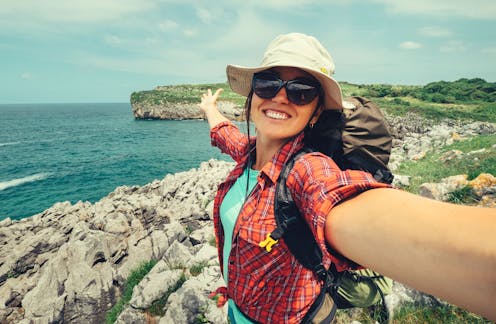Why you should travel solo this summer
- Written by Claire McCamley, Senior Lecturer in marketing, University of Huddersfield

When you think about booking a summer holiday, you might think of trips with partners, friends or family. The idea of going on holiday alone can be daunting, or even unappealing. It raises all kinds of questions – who will you talk to? Who will you eat with? Will you be safe?
There has long been a stigma against solo consumption[1]. Societal norms encourage us to be with someone – leisure experiences are billed as something to share with others[2]. There may also be a level of guilt or self-indulgence associated with solo travel, feeling as if you are shirking responsibility or abandoning time with family.
An increase in single-person households[3], however, means the hospitality industry is now serving solo consumers in addition to families and couples. The continuously blurred line[4] between work and play, particularly for Millennials and younger generations, makes it easier to work remotely or travel as part of our jobs. We are more transient than ever, and have more opportunities to work and travel alone without feeling completely disconnected from the rest of our lives.
Get out of your comfort zone
Being able to do your own thing, without needing to consider others can be relaxing and can also give you the opportunity to do something you’ve never done before, free of judgement. You might want to go to some sort of class, shop or have a complete chill-out day.
Findings from our research indicate that time spent doing things alone can relieve some of the pressures that companions can bring. Alone time gives you the space to experience things in your own time and take in your surroundings without distraction. In doing this, you may find yourself in new situations, away from your comfort zone – an energising and enthralling experience.
Embrace solo traveller culture
Solo travellers have their own way of doing things[17], they have a shared behaviour and process and often become a collective in themselves. They acknowledge the process of travelling alone and respect others doing the same, and may even seek out spaces to be alone, together. Solo travellers can engage in a shared experience and dialogue while maintaining their own individualism – helping each other when needed, but also leave one another alone.
We search for places where we feel we fit … We are happy to smile at one another. We don’t need to chat to engage. We are happy on our own with a coffee. I am amongst my tribe.
References
- ^ stigma against solo consumption (www.tandfonline.com)
- ^ share with others (www.emerald.com)
- ^ single-person households (www.euromonitor.com)
- ^ blurred line (www.forbes.com)
- ^ This article is part of Quarter Life (theconversation.com)
- ^ Working in the metaverse: what virtual office life could look like (theconversation.com)
- ^ Love Island ditches fast fashion: how reality celebrities influence young shoppers’ habits (theconversation.com)
- ^ Long social distancing: how young adults’ habits have changed since COVID (theconversation.com)
- ^ increasingly (www.telegraph.co.uk)
- ^ solo economy (www.futuresplatform.com)
- ^ cruises (www.ncl.com)
- ^ companies (www.flashpack.com)
- ^ Our research (journals.sagepub.com)
- ^ freewriting (www.research.ucsb.edu)
- ^ therapeutic experience (journals.sagepub.com)
- ^ Rawpixel.com / Shutterstock (www.shutterstock.com)
- ^ own way of doing things (www.sciencedirect.com)
Read more https://theconversation.com/why-you-should-travel-solo-this-summer-184000







